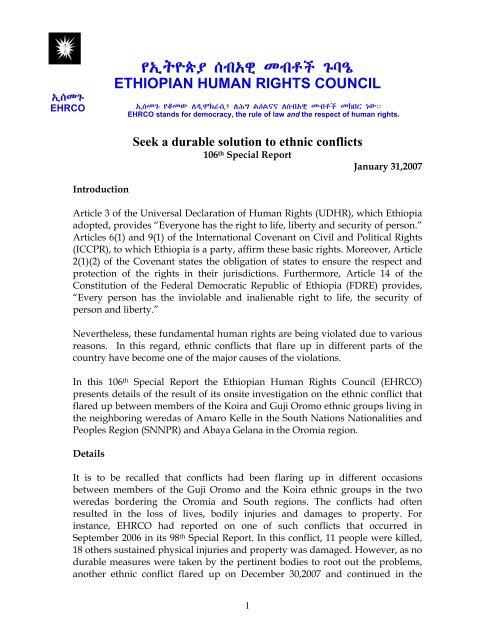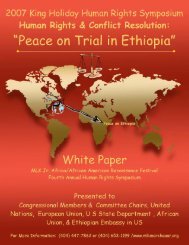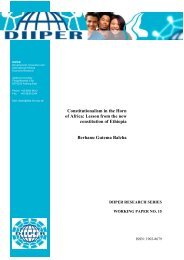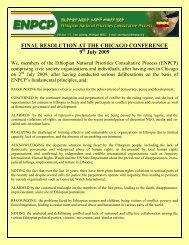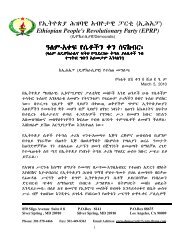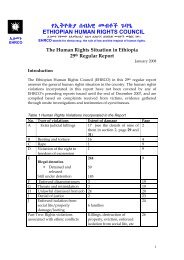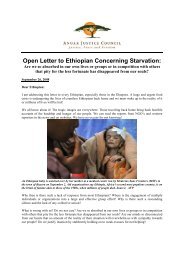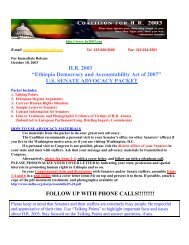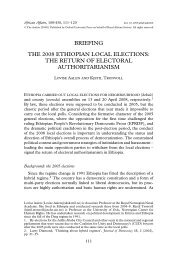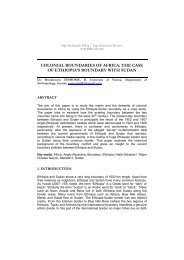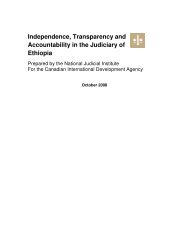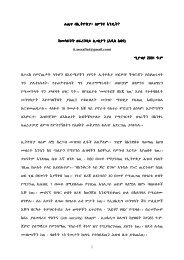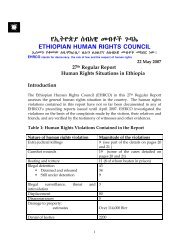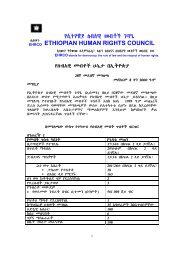103 Special Report - Abbay Media, Ethiopian News
103 Special Report - Abbay Media, Ethiopian News
103 Special Report - Abbay Media, Ethiopian News
Create successful ePaper yourself
Turn your PDF publications into a flip-book with our unique Google optimized e-Paper software.
x!smg#<br />
EHRCO<br />
yx!T×ùÃ sBxêE mBèC g#Æ›@<br />
ETHIOPIAN HUMAN RIGHTS COUNCIL<br />
x!smg# yömW lÄ!äK‰s!½ l?G L:LÂÂ lsBxêE mBèC mkbR nWÝÝ<br />
EHRCO stands for democracy, the rule of law and the respect of human rights.<br />
Seek a durable solution to ethnic conflicts<br />
106 th <strong>Special</strong> <strong>Report</strong><br />
January 31,2007<br />
Introduction<br />
Article 3 of the Universal Declaration of Human Rights (UDHR), which Ethiopia<br />
adopted, provides “Everyone has the right to life, liberty and security of person.”<br />
Articles 6(1) and 9(1) of the International Covenant on Civil and Political Rights<br />
(ICCPR), to which Ethiopia is a party, affirm these basic rights. Moreover, Article<br />
2(1)(2) of the Covenant states the obligation of states to ensure the respect and<br />
protection of the rights in their jurisdictions. Furthermore, Article 14 of the<br />
Constitution of the Federal Democratic Republic of Ethiopia (FDRE) provides,<br />
“Every person has the inviolable and inalienable right to life, the security of<br />
person and liberty.”<br />
Nevertheless, these fundamental human rights are being violated due to various<br />
reasons. In this regard, ethnic conflicts that flare up in different parts of the<br />
country have become one of the major causes of the violations.<br />
In this 106 th <strong>Special</strong> <strong>Report</strong> the <strong>Ethiopian</strong> Human Rights Council (EHRCO)<br />
presents details of the result of its onsite investigation on the ethnic conflict that<br />
flared up between members of the Koira and Guji Oromo ethnic groups living in<br />
the neighboring weredas of Amaro Kelle in the South Nations Nationalities and<br />
Peoples Region (SNNPR) and Abaya Gelana in the Oromia region.<br />
Details<br />
It is to be recalled that conflicts had been flaring up in different occasions<br />
between members of the Guji Oromo and the Koira ethnic groups in the two<br />
weredas bordering the Oromia and South regions. The conflicts had often<br />
resulted in the loss of lives, bodily injuries and damages to property. For<br />
instance, EHRCO had reported on one of such conflicts that occurred in<br />
September 2006 in its 98 th <strong>Special</strong> <strong>Report</strong>. In this conflict, 11 people were killed,<br />
18 others sustained physical injuries and property was damaged. However, as no<br />
durable measures were taken by the pertinent bodies to root out the problems,<br />
another ethnic conflict flared up on December 30,2007 and continued in the<br />
1
following days. As a result, 4 people were killed and 5 others were wounded. A<br />
substantial amount of private and public property was damaged and people<br />
were displaced and fled their homes fearing attacks.<br />
Table 1. Names and other details of persons killed during the conflict<br />
No. Name Sex Age Details<br />
1 Delane Dido M 55 He was a farmer living in the Amaro<br />
Kelle special woreda, Jale Kebele. On<br />
December 31, 2007, he was shot on his<br />
leg by bullet fired by members of the<br />
Guji Oromo ethnic group. Four days<br />
later, his mutilated body was found in a<br />
place called Jijila.<br />
2 Azene Alito M 45 He was a farmer living in the Amaro<br />
Kelle special woreda. On January 1,<br />
2008, he was shot to death by members<br />
of the Guji Oromo ethnic group.<br />
3 Mitiku Benecha M 50 He was a farmer living in the Amaro<br />
Kelle special woreda. On January 1,<br />
2008, he was shot and killed by<br />
members of the Guji Oromo ethnic<br />
group.<br />
4 Solomon Deneke M 43 He was head of the Jalle Mekaneyesus<br />
Church in Amaro Kelle special wereda<br />
Jalle kebele. On January 3, 2008, he was<br />
shot dead by bullets fired by members<br />
of the Guji Oromo ethnic group.<br />
Table 2. Names of individuals who sustained physical injuries<br />
No. Name Details<br />
1 Terefe Tesfaye He is a farmer living in Amaro Kelle special<br />
woreda, Jalle kebele. On December 30, 2007, while<br />
he was on his farm, he was shot and wounded on<br />
his hand and leg by two bullets. He was receiving<br />
medical treatment by the time this report was<br />
being compiled.<br />
2
2 Senbetu Kora He is a resident of Amaro Kelle special woreda,<br />
Jijalo Kebele. On December 31, 2007, he was shot<br />
and wounded on his hand. He was receiving<br />
medical treatment by the time this report was<br />
being compiled.<br />
3 Amare Asfaw He is a resident of Amaro Kelle special woreda,<br />
Jalle Kebele. On December 31, 2007, he was shot<br />
and wounded on his leg. He was receiving<br />
medical treatment by the time this report was<br />
being compiled.<br />
4 Nefsu Tilahun He lives in the Amaro Kelle special woreda, Jalle<br />
Kebele. On December 31, 2007, he was shot and<br />
wounded on his shoulder. He was receiving<br />
medical treatment by the time this report was<br />
being compiled.<br />
5 Abera Sodota He is a resident of Amaro Kelle special woreda,<br />
Jalle Kebele. On January 1,2008 he was shot and<br />
wounded. He was receiving medical treatment by<br />
the time this report was being compiled.<br />
Moreover, during the conflict, 97 thatched cottages, most of which belonging to<br />
members of the Koira ethnic group, were burnt down, 27 corrugated iron sheetroofed<br />
houses were dismantled and 538 corrugated iron sheets were looted as<br />
well as seven granaries, nine heaps of ‘teff’ and nine heaps of soya bean harvest<br />
were all burnt. Moreover, a flourmill used by the community was dismantled<br />
and taken away. Property that belonged to a health post, an agricultural<br />
development station, a police office, a Kebele administration office, the local<br />
office of the election board, a telecom office and the Jallo school were either<br />
looted or burnt down. In addition, an unspecified number of livestock was taken<br />
away. About 800 of families were displaced and fled their homes, and schools<br />
were closed.<br />
The security situation in the area was not completely stable by the time this<br />
report was being compiled although members of the federal police were<br />
deployed. Residents in the area including local authorities that EHRCO<br />
approached expressed their concern that the conflict could recur any time and<br />
result in a more serious catastrophe unless the government sought a lasting<br />
solution to the problem. They also underscored the need to extend protection to<br />
civilians from further attacks.<br />
3
Conclusion<br />
• EHRCO is deeply saddened and vehemently condemns the killings, and<br />
attacks inflicted on members of the Koira ethnic groups.<br />
• EHRCO urges the government once again to bring to justice those who are<br />
responsible for the killings, physical injuries and property damages and to<br />
adequately carry out its constitutional obligation of protecting citizens’<br />
right to life, security and property.<br />
• EHRCO would like to call on all concerned to see to it that commensurate<br />
compensation is paid to the families of those who were killed during the<br />
conflict as well as to those injured and lost their property.<br />
• Furthermore, EHRCO would like to reiterate its appeal that there is a dire<br />
need to examine the root causes of such conflicts and seek a durable<br />
solution.<br />
In addition, EHRCO urges citizens, representatives of national and international<br />
organizations and government envoys that stand for the respect of human rights<br />
and the rule of law, to put pressure on the <strong>Ethiopian</strong> Government to bring<br />
perpetrators of human rights violations to justice, and to extend adequate<br />
protection to citizens’ rights to life, security and property.<br />
CC.<br />
• H.E. Ambassador Teshome Toga, Speaker, House of Peoples<br />
Representatives, FDRE. P.O. Box 80001, Fax: (251-1) 1 55 0900 Tel.<br />
(251-1) 1241013 Addis Ababa, Ethiopia<br />
• H.E. Ato Degife Bula, Speaker, House of Federation, FDRE P.O.Box<br />
80001, Fax: (251-1) 1 55 0722 Tel. (251-1) 1 242301,Addis Ababa,<br />
Ethiopia.<br />
• H.E. Ato Girma Woldegiorgis, President, FDRE. P.O.Box <strong>103</strong>1, Fax:<br />
(251-1) 1 55 2020, Tel. (251-1) 5518850,Addis Ababa, Ethiopia.<br />
• H.E. Ato Meles Zenawi, Prime Minister, FDRE P.O.Box: <strong>103</strong>1, Fax:<br />
(251-1) 1 55 2020, Tel. (251-1) 1 226767, Addis Ababa, Ethiopia.<br />
• H.E. Ato Siraj Fegessa, Minister of Federal Affairs, FDRE. P.O.Box:<br />
1370, Fax: (251-1) 5 520000 Tel. (251-1) 5 520000 Addis Ababa,<br />
Ethiopia.<br />
• H.E. Ato Assefa Kesito, Minister of Justice, FDRE, P. O. Box: 1370,<br />
Fax: (251-1) 5 52 0874, Tel. (251-1) 5 515099,Addis Ababa, Ethiopia.<br />
• H.E. Dr. Mohammod Yasin, House speaker, Oromia Regional State<br />
Council, P.O.Box 101769, Fax, (251-1) 551 3642, Tel. (251-1) 5510455<br />
Addis Ababa, Ethiopia<br />
4
• H.E. Ato Fikru Gnakal, House Speaker, Southern Nations,<br />
Nationalities and Peoples’ Regional State, P. O. Box: 18, Fax: (251-46)<br />
220 1950, Tel. (251-46) 2200042, Awassa, Ethiopia.<br />
• H.E. Ambassador Kassa Gebrehiwot, Chief Commissioner, <strong>Ethiopian</strong><br />
Human Rights Commission, P.O.Box: 1165, Fax: (251-1) 6 45 9290, Tel.<br />
(251-1) 6459228, Addis Ababa, Ethiopia.<br />
• H.E. Ato Abay Tekle, Chief Ombudsman, Institution of Ombudsman,<br />
P. O. Box: 2459, Fax: (251-11) 6 45 9229, Tel. (251-1) 6 635363, Addis<br />
Ababa, Ethiopia<br />
5


